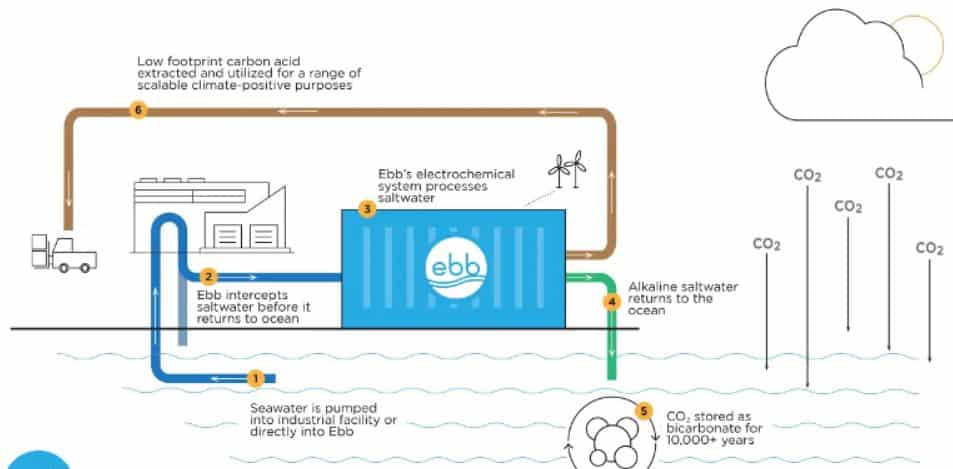Ebb Carbon, an ocean-based carbon dioxide removal (CDR) company founded by former executives of Tesla and Google X, secured a $20 million funding for the development and deployment of its technology.
The investment raised by Ebb Carbon in Series A round is the largest to date in an ocean-based CDR technology. It was raised in two closes, led by Prelude Ventures and Evok Innovations.
The second close brought the total funds raised by the firm to $23 million, seed round is worth $3 million. Joining the recent investment round are investors from Incite, Congruent, and Grantham.
Remarking on Prelude Ventures’ investment, its Managing Director and Co-founder Gabriel Kra, said that:
“The team [Ebb] has previously demonstrated their abilities to build and scale industrial machinery, and has invented a technology that is a least-cost solution for ocean carbon dioxide removal.”
What is Ocean-based Carbon Removal?
The goal of this type of CDR is to enhance and speed up the ocean’s natural ability to capture and store CO2 permanently.
While reducing carbon emissions is a must, it’s not enough to meet the climate goal set during the Paris Agreement. The United Nations Intergovernmental Panel on Climate Change (IPCC) made it clear that removing CO2 already emitted is necessary to avoid the worst effects of climate change.
Currently, there are various CDR technologies that are underway or being developed to do the job. One example is the Direct Air Capture (DAC) which directly draws in CO2 and extracts it for permanent storage underground.
What makes ocean-based CDR different from those technologies is that it turns the 2-step process – capture and storage – into just one. Moreover, it reduces energy use requirements, streamlines the storage part, and offers one of the most cost-effective ways to remove CO2.
The oceans are constantly absorbing and storing CO2 from the atmosphere. But rising levels of this gas do not only change the climate, they also make the ocean more acidic. This, in effect, makes marine life at risk of extinction and coastal communities suffer from it.
Meet Ebb Carbon, a California-based startup that pioneers a new method of carbon removal using electrochemistry.
Ebb Carbon and Its CDR Solution
Ebb Carbon is founded by scientists and climate tech veterans, with a team of chemists, engineers, physicists, oceanographers, and more. Collectively, they have more than 6 decades of experience in developing clean technologies at SolarCity, Tesla, and Google X.
Ben Tarbell, CEO and Co-Founder of Ebb Carbon, commented on the fundraising:
“The ocean is a natural and vastly underutilized ally in this fight. Our approach combines capture and storage into one step, by accelerating naturally occurring processes that benefit from the immensity of the ocean’s surface area. This enables one of the lowest cost solutions for atmospheric CO2 removal at scale.”
The CDR company has developed a solution that’s one of the most promising to remove carbon at the gigaton scale. It’s using an electrochemical ocean alkalinity enhancement technology, which attracted commitments from Stripe for the purchase of carbon removal credits.
Ebb’s solution speeds up a natural process called ocean alkalization that restores ocean chemistry and safely absorbs CO2. It then converts the captured CO2 to bicarbonate, a safe and stable form of the gas.
Ocean alkalization occurs naturally over millions of years but Ebb’s electrochemical system enhances it, in a fraction of the time. The patented CDR tech rearranges the salt and water molecules and turns them into acid and slightly alkaline salt water solutions.
After removing acidity from seawater, Ebb returns the alkaline seawater to the ocean where it mimics the natural alkalization process. This solution results in:
- Ocean deacidification: The alkalinity returned to the ocean acts like an antacid, lowering ocean acidity locally.
- Permanent carbon storage: Bicarbonate naturally resides in the ocean and can store CO2 for 10,000+ years.
- Additional carbon removal: As CO2 in seawater converts to bicarbonate, the ocean pulls down more CO2 from the air.
How Ebb CDR System Works
Ebb’s ocean-based CDR system is modular, can process seawater directly from the ocean, and can be installed near any industrial source of salty water. These include desalination plants, aquaculture or energy production facilities that use ocean water for cooling.
Here’s how the proprietary Ebb Carbon ocean-based CDR system works.
Ebb’s Electrochemical Ocean Alkalinity Enhancement Process
As more CO2 locked away as bicarbonate, the ocean will naturally equilibrate and sequester more CO2 from the air. Ebb measures and monitors the pH level and alkalinity volume it creates using sensors and software. The data they generate is important for measuring and verifying the amount of CO2 that the system removes.
Accurate and verified data is also crucial when the company claims the corresponding carbon credits. Every tonne of CO2 their system removes can earn them one carbon credit.
With the recent $20 million investment, Ebb will start to deploy its first systems. One has the capacity to remove 100 tons of CO2 later this year, and the other system boosts a 1,000 tons removal capacity.


